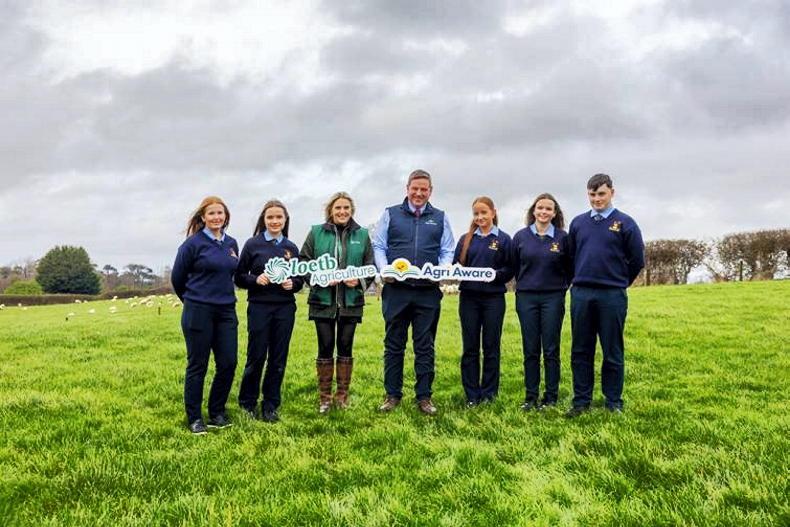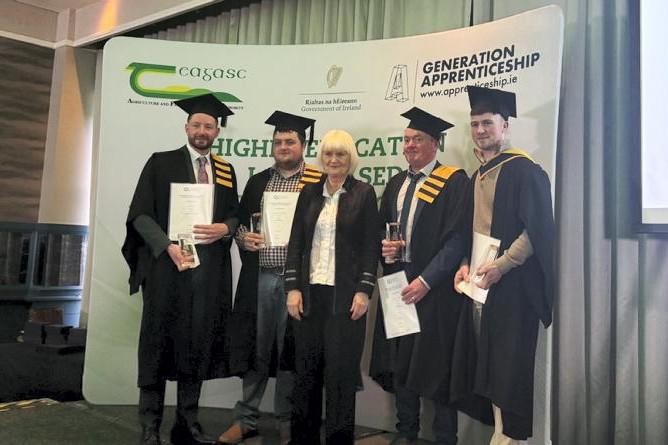With a career centered around pioneering research in animal science and microbiology, Sharon Huws is no stranger to the agricultural industry. Having grown up on a dairy farm in Wales (which later transitioned to a beef suckler enterprise), Sharon was surrounded by animals from a young age.
Sharon has extensive knowledge and experience in research and lecturing, having worked at Aberystwyth University in Wales and, now, as a professor at Queens University Belfast.
Rebelling against agriculture
Growing up in Cardigan - a rural area on the south west coast of Wales - Sharon initially tried to go down a different road.
“My whole family are farmers: my parents, grandparents and their parents before them,” she explains. “I guess I rebelled against that a little bit as I was growing up, although I should have gone on to do an animal science degree, I decided to do zoology, because I thought it was a little bit different from the family for once.”
After working part-time in a local pet shop, Sharon went on to study zoology at Bangor University in north Wales.
“I was taught by quite a few animal scientists and I really began to think, ‘You should have done that,’” she adds.
After completing her degree, Sharon thought she would start working in the sector, but one of her lecturers pointed her towards the possibility of undertaking a PhD.
“I have to say, at that point in time, I was the only person in the family that had ever gone to university. The thought that I could go and do a PhD was uncomfortable and not something that could be natural for anyone in our family to do,” she says.
Finding confidence in research
Coming from a working-class farming background, Sharon tells Irish Country Living that she didn’t have the same confidence or understanding of what a PhD actually was, so she instead decided to do a master’s in veterinary parasitology, which she completed in the Liverpool School of Tropical Medicine.
During her master’s, with some of her lecturers working in the connected veterinary school, Sharon learned a lot about gastrointestinal parasites in livestock and domestic animals which sprung an interest in animal science.
After completing her master’s degree, Sharon worked in a food microbiology company for nine months to gain experience in microbiology, which she felt she needed at the time.
A PhD in microbiology
Then, an opportunity came up for Sharon to start a PhD in microbiology at Manchester University Having now found her confidence in research, she decided to go for it.
“My PhD supervisor was exceptionally eccentric, I had my interview in the pub, and he had a preference over a liquid lunch,” she laughs.
The PhD in microbiology wasn’t linked to animals at all. Sharon had some doubts about that, but as Manchester University had a great reputation she decided to “just go and do it.”
During the PhD, Sharon looked at the interactions of protozoa with biofilm communities, which is very much environmental microbiology.
Continuing on with research, she took up a two-year post-doctoral at Bath University on protozoa and zoonotic vectors.
Teaching the next generation
A post was advertised in Aberystwyth, which at the time was called the Institute of Grassland, Environmental and Rural Sciences [now known as the Institute of Biological, Environmental and Rural Sciences].
Sharon spent nine years working within the university in different roles, including principal investigator in rumen microbiology, lecturer and senior lecturer in animal science.
“I did enjoy the teaching enormously because it’s about our legacy and the next generation coming through,” she says.
“I won’t lie, it was difficult because you’re balancing quite a big research portfolio with the teaching,” she continues. “It was beneficial for students because they got the research-led teaching, so they both came together.”
She jokingly adds, “But an academic life is never an easy one.”
In 2017, Sharon obtained a readership position at Queens University within the Institute for Global Food Security in Belfast.
“Since joining here, we’ve made some massive strides, we’re now ranked number one in the UK for research excellence in agriculture, Food and veterinary sciences out of every university in the UK,” she tells Irish Country Living.
Pioneering research
Nigel Scollan, director of the Institute for Global Food Security, was the lead on a research study Sharon worked on investigating the influence of rumen microbes on meat quality.
“It was a really exciting time,” she recalls. “We had so many projects coming in through the door. So little was known and it required someone who understood the animal and also understood the microbiology.”
A lot of work for Sharon came out of that research, from publications right through to making an impact on meat quality. She worked with Celtic Pride, a premium Welsh beef company, on enhancing the shelf life and the Omega-3 content of their products.
“Microbes in the rumen convert the fat and change it from an omega-3 to a saturated fat. So, what they do isn’t good for human health, but they do it because the omega-3 fats are toxic to them,” she explains.
For anyone who doesn’t understand this process, Sharon breaks it down:
“What we were really trying to do is understand how we could slow down the process, to the extent that the product would have enhanced human health properties. This was happening during the production phase in the rumen when animals were injecting [eating] their food. They were converting all of the good fats into bad ones. But also, what we were doing is looking at levels of antioxidants that should be put into the diet in order to also enhance the shelf life at the end.”
Current research projects
Sharon is working on many projects at the moment; many of which are funded by the EU.
One looks at microbiomes across food systems, while another looks at “the hollow ruminant”, or how microbiomes are exchanged within animals and long-term resistance.
“I think what’s really interesting about all of the work that I do actually is, I go from the very fundamental microbiology of understanding what this gene and this microbe do,” she says.
Other current research involves looking at seaweeds for mitigating methane. Sharon emphasises, “There’s something magical about seaweed, there’s a consumer acceptability.”
The Sir John Hammond Award
Earlier in March this year, Sharon was awarded the prestigious Sir John Hammond Award for her groundbreaking work on improving livestock production efficiency through microbiology.
Her research has led to a better understanding of the role that gut microbes play in animal health and performance and has paved the way for new approaches to feed formulation and management.
“I’m still smiling about it because as I said to many people, you know, I haven’t even won a raffle before. To win that was quite something,” she says.
Talent coming through
Emphasising that agriculture is one of - if not the most - important industries at this point in time, Sharon tells Irish Country Living that we need more people studying agricultural science who can help shape the future.
“We have to produce high-quality foods to feed the world but we also need to have educated people coming out of the system that can navigate the complexities, of producing that food against the backdrop of climate change.”
Women in agriculture
Sharon is passionate about equality, diversity and inclusion, “It’s so incredibly important and the sector does still need a change,” she said.
She continues, “In particular we need the females coming through, I have sat on many panels now where I’ve been the only female and we see it all the time at conferences”









SHARING OPTIONS